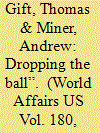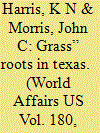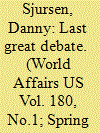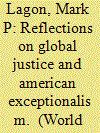|
|
|
Sort Order |
|
|
|
Items / Page
|
|
|
|
|
|
|
| Srl | Item |
| 1 |
ID:
155584


|
|
|
| 2 |
ID:
155592


|
|
|
|
|
| Summary/Abstract |
From the Roman Colosseum to the Yankee Stadium, the Olympics to the Super Bowl, sports have always played a central role in societies. With so much at stake—money, pride, power (and occasionally even fun)—sports are undeniably political. Yet despite this recognition, political scientists and policy scholars devote little attention to the study of sports, especially compared with other disciplines like business, law, and economics. We offer reasons for this void and suggest how political scientists can begin to fill it. In our view, the nexus between sports and politics is not only a vital topic of study on its own, but it can also provide a lens through which to examine—and test—broader questions in the discipline. We propose how scholars can think more systematically about the interaction of politics and sports and leverage the distinctive qualities of sports to improve causal identification across a range of issue areas and subfields in political science and policy studies.
|
|
|
|
|
|
|
|
|
|
|
|
|
|
|
|
| 3 |
ID:
155591


|
|
|
|
|
| Summary/Abstract |
Several scholars have pointed to a gap between the social movement and policy literatures, and argue that the failure of each field to incorporate the other creates a missing link in our understanding of how social movements and policy shape each other. This study provides an opportunity to make these links by applying John Kingdon’s multiple streams framework of agenda setting to the marijuana movement in Texas. Texas, an unlikely candidate for marijuana reform, was the site of sustained efforts to change marijuana laws during the 2015 legislative session. This research offers evidence about the ways in which social movements influence the policy process, and how the policy process responds to activist efforts. We find that despite well-organized movement efforts, political influence was limited. We argue that the reform movement’s inability to control activist participation presents additional challenges in a nonballot initiative state such as Texas.
|
|
|
|
|
|
|
|
|
|
|
|
|
|
|
|
| 4 |
ID:
155585


|
|
|
|
|
| Summary/Abstract |
Most U.S. scholarship on the political history of the First Persian Gulf War covers the general debate between the branches of government or among the international community. Several works address the length and quality of the legislature’s deliberation. The few studies examining veteran’s demographics in Congress mostly do so from a macro perspective. None meaningfully scrutinize the personal military service of individual congressmen or how the sheer quantity of veterans in the 102nd Congress influenced the debate. Correcting this oversight, this article shows how politically influential the personal experiences of so many legislators actually were. I argue that the quantity of veterans in the 101st and 102nd U.S. Congresses demonstrably influenced the character and quality of the debate preceding the war in two ways. First, veterans rendered arguments in the context of military experiences and reached conclusions from a veteran’s as much as a legislator’s perspective. Second, their common wartime participation generated a collegial atmosphere of mutual respect and serious deliberation largely free from normal partisan pressure—which stands in stark contrast to contemporary congressional gridlock. In doing so, I show that permeating this discourse and the emotional, yet civil, debate was a powerful source of historical memory.
|
|
|
|
|
|
|
|
|
|
|
|
|
|
|
|
| 5 |
ID:
155589


|
|
|
|
|
| Summary/Abstract |
American exceptionalism is a double-edged sword, often taking the form of a cultural predisposition to promote universal values to the world, but also taking a form of exempting the United States from scrutiny regarding living by those values itself. As 46.1 percent of the American public voted for the latter version of American exceptionalism in 2016, this essay examines several areas of that self-exemption, including treaties the United States fails to sign or ratify, trade policies, trafficking in persons policy, torture in counterterrorism policy, targeting Muslims indiscriminately in drone strikes and screening refugees, transparency lacking in campaign finance, trust in institutions, and the style of populism emergent in the 2016 election. There are prospects for renewal when such a gap emerges between ideas and institutions, based on earlier cycles in American history. U.S. legitimacy as a powerful catalyst for a world order favoring human dignity depends on being an exemplar.
|
|
|
|
|
|
|
|
|
|
|
|
|
|
|
|
| 6 |
ID:
155590


|
|
|
|
|
| Summary/Abstract |
Much has been written about “American exceptionalism” in social policy, but one aspect has received relatively little attention thus far: the absence of universal public social programs where entitlements to benefits and services are derived from citizenship or residency. This absence is especially striking because other liberal welfare regimes such as Canada and the United Kingdom have long developed such programs. Focusing on policy design and using Canada as a contrasting case, this article explains why there are no universal social programs in the United States, a country where the dichotomy between social assistance and social insurance dominates. The empirical analysis focuses on three policy areas: health, pensions, and family benefits. Stressing the impact of institutional factors on policy design, the article adopts a historical institutionalist approach and shows that the explanation for the absence of universal social programs varies from one policy area to the next.
|
|
|
|
|
|
|
|
|
|
|
|
|
|
|
|
|
|
|
|
|